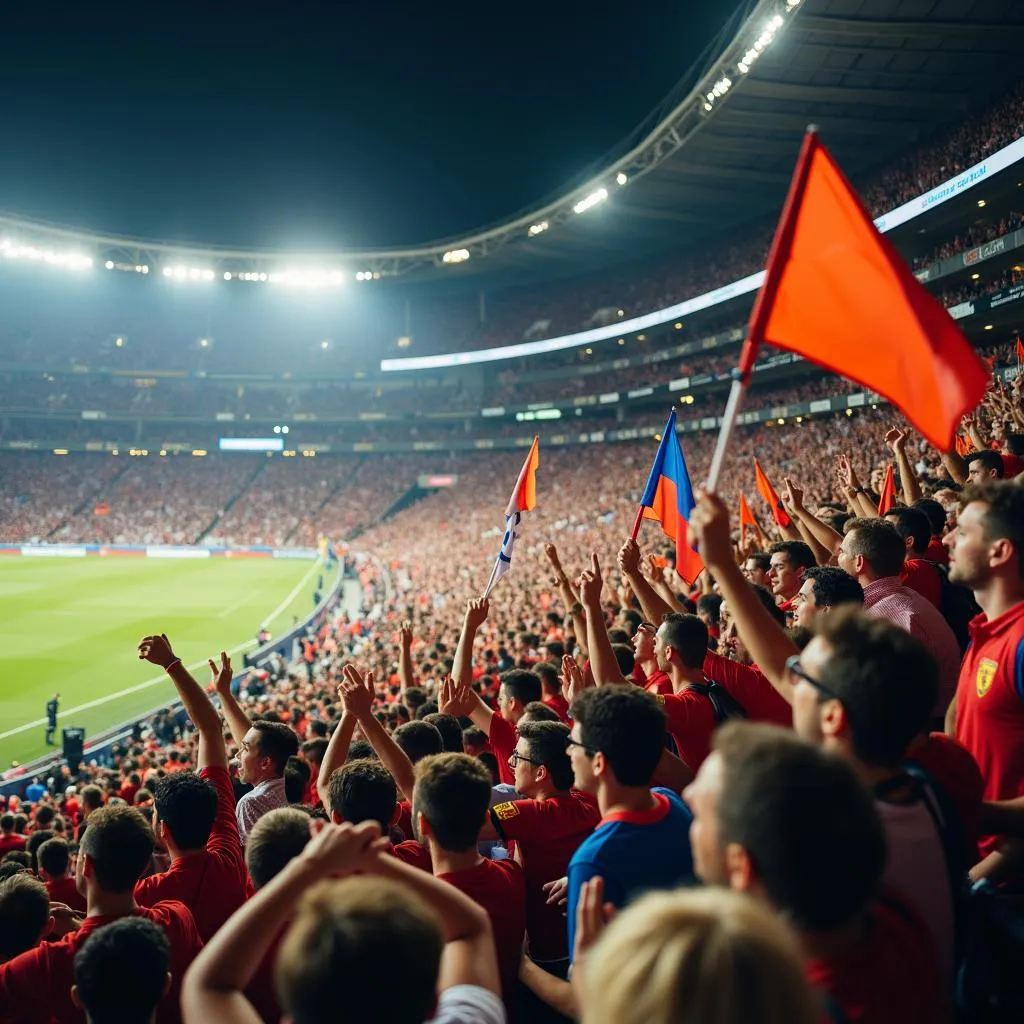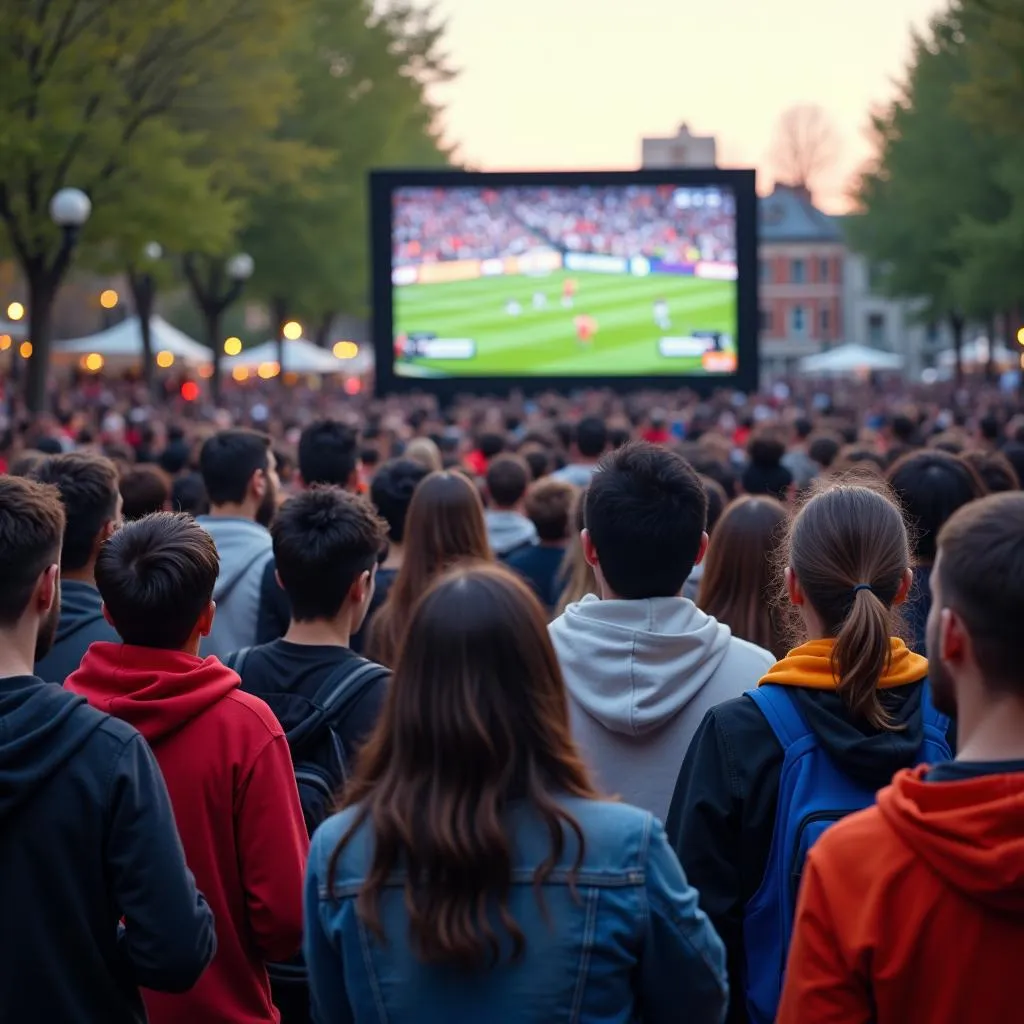The topic of describing a recent sports event is a common one in IELTS Speaking tests. It allows examiners to assess your ability to narrate experiences, express opinions, and use sports-related vocabulary. This topic has appeared frequently in past IELTS exams and is likely to continue being a popular choice for future tests. Let’s explore how to effectively answer questions related to this topic across all parts of the IELTS Speaking test.
Part 1: Introduction and Interview
In this section, the examiner may ask you some general questions about sports and sporting events. Here are some possible questions and sample answers:
Q: Do you enjoy watching sports events?
Band 6-7 Answer:
Yes, I do enjoy watching sports events. I find them exciting and entertaining. I particularly like watching football matches on TV with my friends.
Band 8-9 Answer:
Absolutely! I’m quite passionate about sports and find great enjoyment in watching various sporting events. There’s something incredibly thrilling about the atmosphere, the competition, and the display of human athleticism. I’m particularly fond of live football matches, where the energy of the crowd adds an extra dimension to the experience.
Q: What’s the most popular sport in your country?
Band 6-7 Answer:
In my country, football is by far the most popular sport. Almost everyone follows the national team and the local leagues. It’s a big part of our culture.
Band 8-9 Answer:
Without a doubt, football reigns supreme in terms of popularity in my country. It’s not merely a sport but a cultural phenomenon that unites people across all social strata. The national football team’s performance in international tournaments often becomes a matter of national pride, and the local leagues generate intense rivalries and passionate followings among fans.
 Excited sports fans cheering in a stadium
Excited sports fans cheering in a stadium
Part 2: Long Turn
In this section, you’ll be given a cue card with a topic and some prompts. Here’s a sample cue card related to describing a recent sports event:
Cue Card
Describe a recent sports event you watched. You should say:
- What the event was
- Where you watched it
- Who you watched it with
- And explain why you enjoyed watching it (or why you didn’t enjoy it)
You have one minute to prepare and should speak for 1-2 minutes.
Sample Answer (Band 8-9)
I’d like to talk about a thrilling football match I watched recently – the UEFA Champions League final between Manchester City and Inter Milan. This highly anticipated event took place just last month, and I had the privilege of watching it live on television with a group of close friends at my apartment.
The atmosphere was electric, even through the screen. We had all gathered together, donning our favorite team’s colors and preparing snacks for what we knew would be an intense 90 minutes. As avid football fans, we were all on the edge of our seats throughout the match.
What made this event particularly enjoyable was the high stakes involved. Both teams were vying for one of the most prestigious trophies in club football, and the level of skill on display was truly phenomenal. The tactical gameplay, the individual brilliance of players like Kevin De Bruyne and Lautaro Martinez, and the nail-biting moments as both teams came close to scoring created an unforgettable experience.
Moreover, watching with friends enhanced the enjoyment significantly. We passionately debated every referee decision, celebrated each successful play, and groaned collectively at near misses. This shared experience made the event more than just a game; it was a social occasion that strengthened our bonds.
In the end, Manchester City emerged victorious with a narrow 1-0 win, but the real victory for me was the sheer excitement and camaraderie I experienced throughout the event. It reaffirmed my love for the sport and left me eagerly anticipating the next big match.
Follow-up Questions
- Do you think watching sports events live is better than watching them on TV?
Band 6-7 Answer:
Yes, I think watching sports events live is generally better. You can feel the atmosphere and excitement more. However, watching on TV is more convenient and comfortable.
Band 8-9 Answer:
While both experiences have their merits, I believe watching sports events live often provides a more immersive and exhilarating experience. The electric atmosphere of a stadium, the collective energy of thousands of fans, and the unfiltered, real-time action create a unique environment that television can’t fully replicate. However, TV viewing offers its own advantages, such as close-up replays, expert commentary, and the comfort of home. Ultimately, the choice depends on personal preferences and circumstances.
- How do you think sports events impact local communities?
Band 6-7 Answer:
Sports events can have a big impact on local communities. They bring people together and can boost the local economy. They also give people something to be proud of and talk about.
Band 8-9 Answer:
Sports events can have a multifaceted impact on local communities. Firstly, they often serve as a catalyst for social cohesion, bringing diverse groups together under a shared interest. They can stimulate the local economy through increased tourism, job creation, and business opportunities. Moreover, successful sports teams or events can enhance community pride and put smaller towns on the map. However, it’s important to note that there can also be challenges, such as infrastructure strain or potential for hooliganism, which communities need to manage effectively.
 Local community gathered to watch sports event
Local community gathered to watch sports event
Part 3: Two-way Discussion
In this section, the examiner will ask you more abstract questions related to the topic. Here are some possible questions and sample answers:
Q: How do you think technology has changed the way we experience sports events?
Band 6-7 Answer:
Technology has made a big difference in how we watch sports. We can now watch high-quality broadcasts on different devices. It’s also made it easier to get information about teams and players.
Band 8-9 Answer:
Technology has revolutionized our experience of sports events in numerous ways. High-definition broadcasts and virtual reality technologies have brought us closer to the action than ever before, offering immersive viewing experiences from the comfort of our homes. Social media platforms have transformed how fans interact with each other and with athletes, creating global communities around sporting events. Additionally, data analytics and instant replays have enhanced our understanding of the games, allowing for more informed discussions and strategic insights. However, this technological integration also raises questions about the authenticity of the experience and whether it might be detracting from the raw, in-person excitement of traditional sports viewing.
Q: Do you believe that hosting major sports events is beneficial for a country?
Band 6-7 Answer:
Yes, I think hosting major sports events can be good for a country. It can boost tourism and the economy. It also puts the country in the spotlight and can improve its image internationally.
Band 8-9 Answer:
The impact of hosting major sports events on a country is a complex and multifaceted issue. On one hand, such events can bring significant benefits. They can stimulate economic growth through increased tourism and infrastructure development, enhance a country’s global profile, and foster national pride. These events can also leave a lasting legacy in terms of improved sporting facilities and increased interest in sports among the population.
However, it’s crucial to consider the potential drawbacks. The enormous costs associated with hosting these events can lead to financial strain, especially if the infrastructure isn’t utilized effectively post-event. There are also concerns about displacement of local communities, environmental impact, and whether the benefits truly reach all segments of society.
Ultimately, the net benefit depends on careful planning, sustainable execution, and long-term strategies to leverage the event for lasting positive impact. It’s not a one-size-fits-all situation, and each country must weigh the pros and cons in the context of their specific economic, social, and political circumstances.
Key Vocabulary and Phrases for High Scores
-
Exhilarating /ɪɡˈzɪləreɪtɪŋ/ (adjective): Very exciting and enjoyable.
Example: The match was an exhilarating experience from start to finish. -
Phenomenal /fəˈnɑːmɪnl/ (adjective): Very remarkable; extraordinary.
Example: The athlete’s performance in the final was nothing short of phenomenal. -
Nail-biting /ˈneɪl baɪtɪŋ/ (adjective): Extremely tense or exciting.
Example: It was a nail-biting finish as both teams were tied in the last minute. -
Camaraderie /ˌkæməˈrɑːdəri/ (noun): Mutual trust and friendship among people who spend a lot of time together.
Example: The camaraderie among fans of the same team was evident in their celebrations. -
Immersive /ɪˈmɜːrsɪv/ (adjective): Providing, involving, or characterized by deep absorption or immersion in something.
Example: Virtual reality technology provides an immersive sports viewing experience.
How to talk about a time you were proud of a family member in IELTS Speaking
Examiner’s Advice
To score high in the IELTS Speaking test when describing a sports event:
- Use a variety of descriptive vocabulary to bring your experience to life.
- Structure your answer logically, addressing all parts of the question.
- Provide specific details and examples to support your points.
- Show your ability to discuss both personal experiences and broader implications.
- Practice speaking fluently and coherently for 2 minutes without long pauses.
- Be prepared to express and justify opinions on related topics.
Remember, the key to success is not just knowing about sports, but being able to articulate your thoughts clearly and engagingly. Regular practice with a variety of sports-related topics will help you feel more confident and perform better in the actual test.
Describe a beach or seaside area you want to visit
By following these guidelines and using the sample answers as inspiration, you’ll be well-prepared to tackle any question about sports events in your IELTS Speaking test. Good luck with your preparation!


